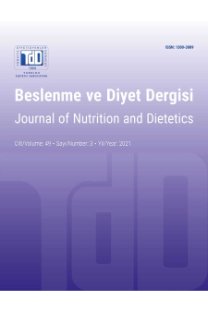Bariatrik Cerrahi Hastalarında Beslenme ve Davranış Tutumu Ölçeği
Nutrition and Behavior Attitudes Scale in Bariatric Surgery Patients
___
- 1. Wu E, Luk A, Simon K, Wong H, So WY, Kong A, et al. Health-related quality of life after bariatric surgery and its correlation with glycaemic status in Hong Kong chinese adults. Obes Surg 2016;26(3):538-545
- 2. Jastrzebska-Mierzynska M, Ostrowska L, Dadan J. Dietary habits of obese patients qualified for bariatric procedures. Rocz Panstw Zakl Hig 2014;65(1):41-47.
- 3. Lindekilde N, Gladstone BP, Lübeck M, Nielsen J, Clausen L, Vach W, et al. The impact of bariatric surgery on quality of life: a systematic review and metaanalysis. Obes Rev 2015;16(8):639-651.
- 4. Andrade CGDC, Lobo A. Weight loss in the first month post-gastroplasty following diet progression with introduction of solid food three weeks after surgery. ABCD. Arq Bras Cir Dig 2014;27:13-16.
- 5. Berry EM. Health-related quality of life changes and weight reduction after bariatric surgery vs. a weightloss program. Isr J Psychiatry Relat Sci 2013;50(3):194- 200.
- 6. Oh SH, Song HJ, Kwon JW, Park DJ, Lee YJ, Chun H, et al. The improvement of quality of life in patients treated with bariatric surgery in Korea. J Korean Surg Soc 2013;84(3):131-139.
- 7. Soares FL, Bissoni de Sousa L, Corradi-Perini C, Ramos da Cruz MR, Nunes MG, Branco-Filho AJ. Food quality in the late postoperative period of bariatric surgery: an evaluation using the bariatric food pyramid. Obes Surg 2014;24(9):1481-1486.
- 8. Pepino MY, Stein RI, Eagon JC, Klein S. Bariatric surgery-induced weight loss causes remission of food addiction in extreme obesity. Obesity 2014;22(8):1792- 1798.
- 9. Polsky S, Donahoo WT, Lyons EE, Funk KL, Elliott TE, Williams R, et al. Evaluation of care management intensity and bariatric surgical weight loss. Am J Manag Care 2015;21(3):182-189.
- 10. Alpar R. Spor, Sağlık ve Eğitim Bilimlerinden Örneklerle Uygulamalı İstatistik ve GüvenirlikGeçerlik. Detay Yayıncılık, Ankara, 2016.
- 11. Foster GD, Wadden TA, Vogt RA. What is reasonable weight loss? Patients’ expectations and evaluations of obesity treatment outcomes. J Consul Clin Psychol 1997;65(1):79-85.
- 12. Wee CC, Hamel MB, Apovian CM, Blackburn GL, Bolcic-Jankovic D, Colten ME, et al. Expectations for weight loss and willingness to accept risk among patient seeking weight loss surgery. JAMA Surg 2013;148(3):264-271.
- 13. Faulconbridge LF, Wadden TA, Thomas JG, JonesCorneille LR, Sarwer DB, Fabricatore AN. Changes in depression and quality of life in obese individuals with binge eating disorder: bariatric surgery versus lifestyle modification. Surg Obes Relat Dis 2013;9(5):790-796.
- 14. de Zwaan M Georgiadou E, Stroh CE, Teufel M, Köhler H, Tengler M, et al. Body image and quality of life in patients with and without body contouring surgery following bariatric surgery: a comparison of pre-and post-surgery groups. Front Psychol 2014;1310(5):1-10.
- ISSN: 1300-3089
- Yayın Aralığı: Yılda 3 Sayı
- Başlangıç: 1972
- Yayıncı: Türkiye Diyestisyenler Derneği
Gamlar: Besin Alımı Üzerine Etkileri
DUYGU AĞAGÜNDÜZ, EFSUN KARABUDAK
Bariatrik Cerrahi Hastalarında Beslenme ve Davranış Tutumu Ölçeği
Ece ÇELİK, ERDEM KARABULUT, PELİN BİLGİÇ
Beslenme Rehberleri ve Su Ayakizi
Şizofreni Hastalarında Metabolik Profil ve Diyet Örüntüsü
İNCİ TÜRKOĞLU, Emine YILDIZ, Seyit M. MERCANLIGİL
Lösemili Çocuklarda Beslenme Durumu: Tedavi Dönemi ile Tedavi Sonrası Dönem Farklı Mıdır?
KÜBRA TEL ADIGÜZEL, ORHAN GÜRSEL, HÜLYA GÖKMEN ÖZEL
Beslenme Bilgi Düzeyinin Değerlendirilmesinde Sağlık Okuryazarlığı Yeterli mi?
BERNA MADALI, DERYA DİKMEN, BİRGÜL PİYAL
ELİF EROĞLU HALL, ATİLA GÜLEÇ, AYLİN AYAZ
Kistik Fibrozise Bağlı Gelişen Diyabette Tıbbi Beslenme Tedavisi: Bir Olgu Sunumu
Hatice AKBIYIK, Elmas Ebru Güneş YALÇIN, Deniz Doğru ERSÖZ, Nural KİPER, Hayriye Uğur ÖZÇELİK
